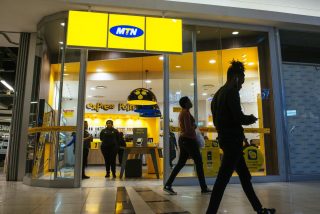In a bid to drive customer engagement and enhance their experience while navigating its Mobile Money (MoMo) platform, MTN Group has launched the first mobile payments system in Africa to be powered by Artificial Intelligence (AI) and a messaging service.
With this innovation, MTN Group President and CEO, Rob Shuter said the company can improve how it interacts with customers in scale. Users can make inquiries anytime and anywhere and they will be provided with the right answers to their questions at the right time, through a variety of channels including social networks and messaging applications.
Specifically, the AI mobile money chatbot allows customers to get information, engage with the MoMo services and make payments through various social media platforms like WhatsApp, Facebook Messenger, and SMS. Over time, the service will be included in MTN’s newly-released advanced instant messaging service “Ayoba”.
The chatbot, which debuted in Ivory Coast last month, is expected to be rolled out across MTN’s MoMo footprint soon. “We are passionate about bringing the power of our mobile money solutions to more than 60 million customers across Africa over the next few years,” Shuter said.
The advancements in MTN’s mobile money service and its planned expansion across the continent, come as a major boost to efforts geared towards achieving financial inclusion in Africa generally, and particularly in Nigeria where it plans to commence operations in the second half of this year.
A key component of the financial inclusion strategy of the Central Bank of Nigeria (CBN) is the integration of telecoms companies in the provision of financial services through mobile technology due to their wide coverage and market base. Whereas other major competitors like Airtel and Globacom have indicated interest in mobile money services, being the first to launch its product, as well as the largest network operator in the country by subscriber base, gives MTN a headstart in the market.
Expressing MTN’s commitment to improving financial inclusion using a range of solutions to address the needs of various market segments, the Group CEO averred that “While MTN has made great strides in these areas, we will continue working to deliver our vision for MTN to become one of the largest Fintech players across our footprint.”
The telecoms company has been nurturing plans to expand its mobile money service to other African markets in a bid to secure a significant share in the continent’s unbanked market. Last November, MTN and Orange, the largest mobile operator in Francophone Africa, launched Mowali – a continent-wide mobile money interoperability joint venture which allows users to send money between mobile money accounts across different providers.
The service was reported to be immediately open to users of MTN Money and Orange Money. Moreover, it could be enabled for other mobile money providers and banks, possibly serving the over 300 million mobile money users in Africa. MTN and Orange have operations in 22 African countries.
Apart from being a “wakeup call” to other players in Nigeria’s telecommunications industry, the intended launch of MTN’s MoMo would also intensify the competition with both traditional banking institutions and modern financial technology (Fintech) startups in the race to gain access to the underbanked and underserved population.
Albeit, there is a tendency for mobile network operators to dominate the market based on their customer base. Data from the Nigerian Communications Commission (NCC) show that the major telecom players – MTN, Globacom, Airtel, and 9mobile – have around 120 million subscribers among them. Paga, with eight million users, is the only non-telecom mobile money operator that comes close, with the financial sector being far off.
As indicated by Nairametrics, the success of the mobile money platform M-Pesa in Kenya is a motivating factor for telecom companies. The service was launched by Vodafone for Safaricom and Vodacom (all of whom are telecommunications companies). M-Pesa now records more accounts than banks, with 93 percent of Kenyans having access to mobile payments.
With a strong base, the path may be clear for network companies to dominate the mobile money market in Nigeria and Africa at large. However, regulatory issues such as restrictions from giving loans and minimum capital base could prove a stumbling block in the success of telecoms-driven mobile money service across the continent.








